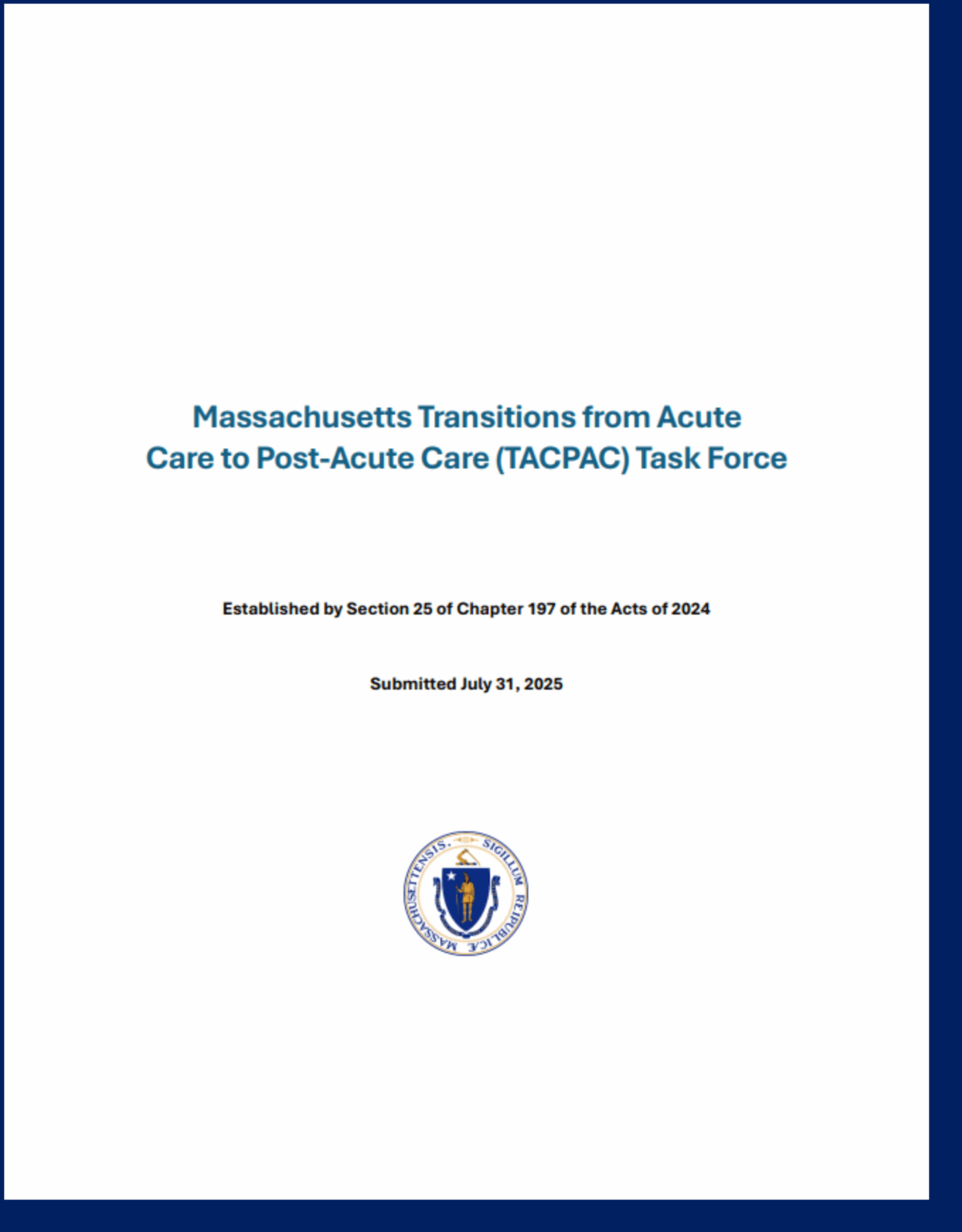Task Force Underscores Urgency to Address Capacity Constraints

A task force created under the 2024 Act to Improve Quality and Oversight of Long-Term Care has released its legislatively mandated report and recommendations on how to create a more cohesive continuum of care and resolve the issue of patients being stuck in hospitals to ensure they get to the next level of care in a timely and safe manner.

The 17-member Massachusetts Transitions from Acute Care to Post-Acute Care (TACPAC) Task Force was chaired by Executive Office of Health and Human Services Assistant Secretary Joanne Marqusee and was made up of representatives from across the hospital and healthcare field.
The law, task force, and report came about as Massachusetts confronts head-on the fact that its healthcare system regularly has approximately 2,000 patients who remain hospitalized each day despite being medically ready for discharge. (MHA’s monthly hospital throughput survey was cited in the report.) Those backups reverberate through the system, resulting in patients boarding in emergency departments or foregoing care rather than waiting, and more than $400 million in annual losses for hospitals.
“The problem is multi-faceted and often driven by one or more of the following: legal and decision-making challenges, post-acute care capacity constraints, payer-related complexities, fragmented care coordination, complex needs, and non-emergency transportation challenges,” the task force wrote.
Specifically, the report notes:
- Patients often lack a legally authorized decision-maker—such as a guardian or Health Care Proxy—which can delay care planning and discharge;
- Post-acute capacity is affected by workforce shortages, limited availability for patients with complex needs, “and the need for more flexible service models such as hospital-at-home, mobile integrated health, remote patient monitoring, telehealth, or co-located care options;”
- “Insurance related challenges” such as prior authorizations and out-of-network placements inhibit care transfers (see surgical mortality story below);
- Patients experiencing behavioral health needs, homelessness, dementia, or interactions with the criminal justice system are especially affected, as are those who need specialized programs such as psychiatric care in a skilled nursing facility, group living environments, bariatric equipment and care, and long-term care in a nursing home; and
- Reliable transportation from one care site to another is often lacking and delayed.
The law that created the task force also took steps to resolve the issue, by mandating timely prior authorization replies and by requiring the Division of Insurance to develop a standard prior auth form, among other steps. The state also has a discharge support team to assist insurers and providers with the toughest cases.
The core of the report focuses on the next steps the state and healthcare system can take to further advance long-term care. These suggestions include many elements that MHA has proposed through legislation now pending at the State House, including bills that would expand recruitment and support of individuals to serve as guardians (H1412/S903); expanding mobile integrated healthcare programs (H1154/S726); supporting hospital-at-home care (H1141/SB806); and exploring new behavioral health transportation models that relieve the need for long-distance ambulance transport for low-risk patients (H2234/S1397).
“This report recognizes that hospitals across Massachusetts are continuing to face challenges discharging patients who are medically ready to transition to post-acute care settings. These delays contribute to hospital crowding and suboptimal care transitions, underscoring the need for better coordination, infrastructure, and system accountability – especially as the population continues to age. The recommendations reflect the necessity to work in partnership across the care continuum and with the state to explore and implement solutions that can allow our patients to move safely, seamlessly, and efficiently through the healthcare system.”
Adam Delmolino
Senior Director of Virtual Care & Clinical Affairs
Massachusetts Health & Hospital Association
Delmolino praised the actions to date by the Healey-Driscoll administration and the legislature and urged passage this session of the provisions recommended in the report that can help resolve the patient transfer and capacity crises.
Other TACPAC members from the hospital community included Shauna Dube, senior project manager, post-acute care strategy & flow initiatives, UMass Memorial Medical Center; Tracy Lee, associate chief nurse, ambulatory & emergency services, Beth Israel Deaconess Medical Center; and Mary McClintock, associate chief nursing officer for care progression, South Shore Health.

 Massachusetts Health & Hospital Association
Massachusetts Health & Hospital Association